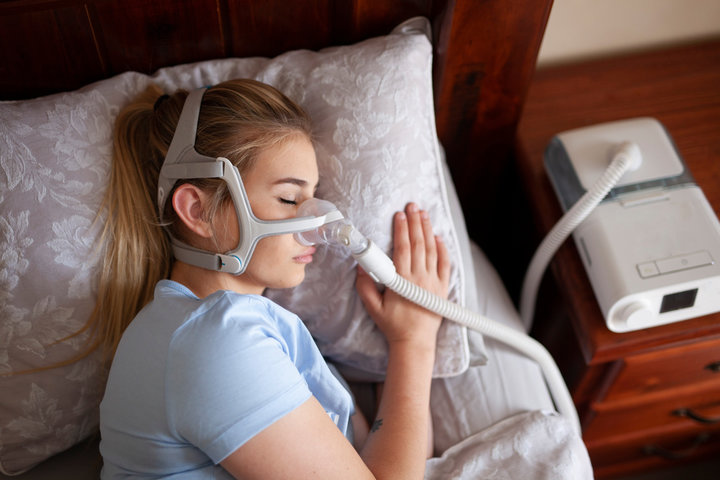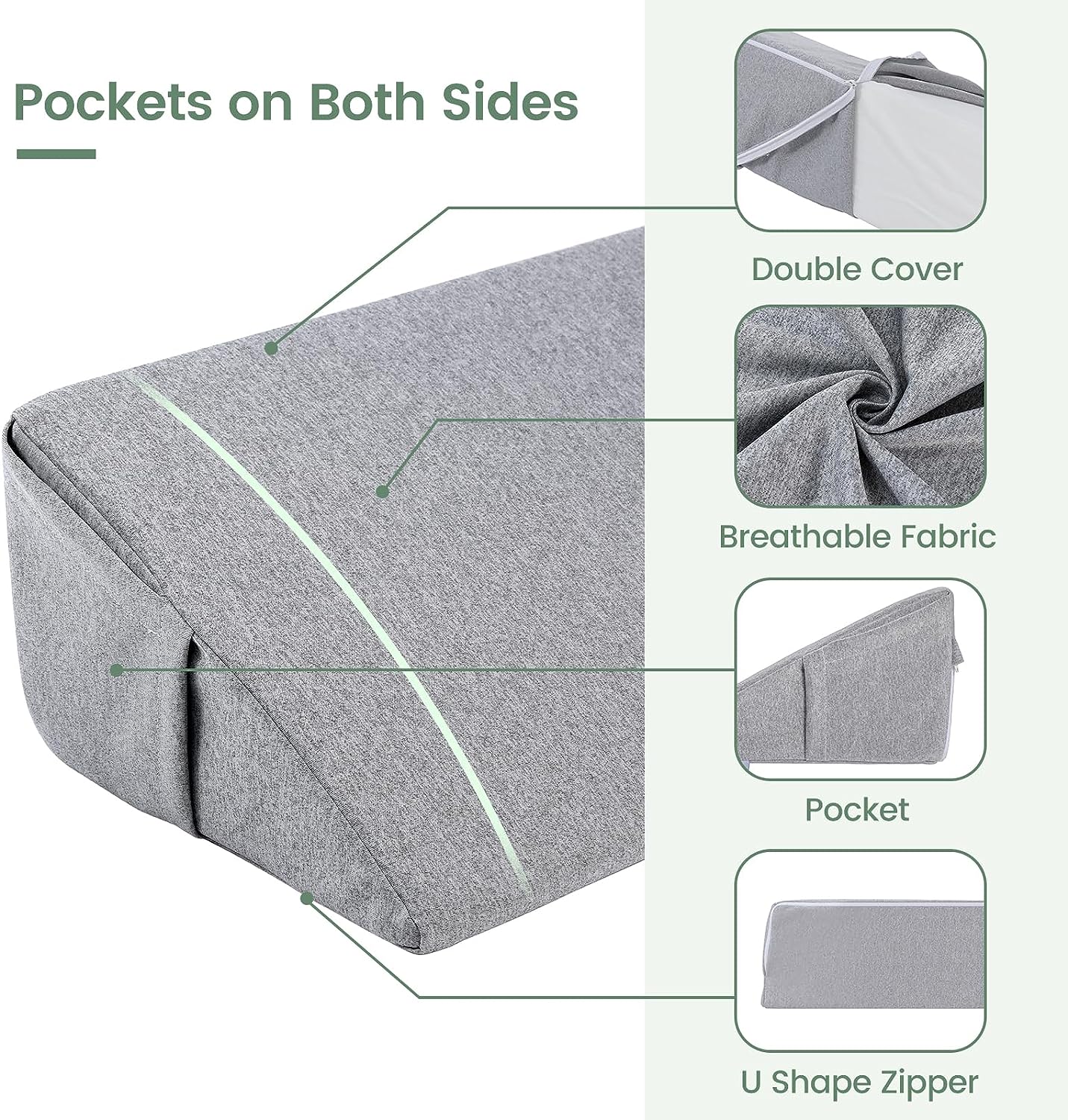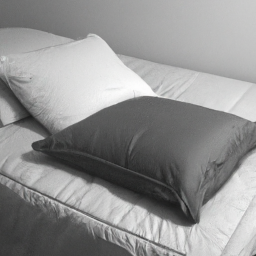Have you ever wondered if a simple pillow could help improve sleep apnea symptoms? It turns out, many people have found relief with the use of a wedge pillow. In this article, we’ll explore the benefits of using a wedge pillow for sleep apnea and how it can potentially improve your symptoms. So, if you’re tired of restless nights and looking for a natural way to alleviate your sleep apnea, keep reading to learn more.
Sleep apnea is a common sleep disorder that affects millions of people worldwide. It is characterized by pauses in breathing during sleep, often accompanied by loud snoring and a feeling of being constantly tired. While there are various treatment options available for sleep apnea, using a wedge pillow is one method that has gained attention in recent years.
A wedge pillow is a specially designed pillow that elevates your upper body while you sleep. By propping yourself up at a slight incline, it helps to keep your airways open and reduces the likelihood of breathing interruptions. Additionally, the elevated position can also reduce snoring and improve overall sleep quality. Many individuals who have incorporated a wedge pillow into their sleep routine have reported positive effects on their sleep apnea symptoms.
So, if you’re looking for a non-invasive and affordable way to manage your sleep apnea, using a wedge pillow could be worth a try. In our upcoming article, we’ll dive deeper into the science behind how a wedge pillow works, discuss the various types of wedge pillows available, and provide tips on how to choose the right one for your needs. Stay tuned to learn more about how a simple pillow can potentially improve your sleep apnea symptoms and help you enjoy a more restful night’s sleep.
What is Sleep Apnea?
Sleep apnea is a common sleep disorder characterized by interrupted breathing during sleep. People with sleep apnea experience pauses in their breathing multiple times throughout the night, which can lead to a variety of symptoms and health complications. It is estimated that approximately 22 million Americans suffer from sleep apnea, making it a significant concern in the medical community.
Types of sleep apnea
There are three main types of sleep apnea: obstructive sleep apnea (OSA), central sleep apnea (CSA), and complex sleep apnea syndrome (CompSAS). OSA is the most common type and occurs when the airway becomes blocked due to relaxed throat muscles. CSA, on the other hand, is caused by the brain’s failure to send proper signals to the muscles that control breathing. CompSAS is a combination of both OSA and CSA.
Causes of sleep apnea
Sleep apnea can be caused by various factors, including obesity, family history, physical obstructions in the airway, and certain medical conditions such as hypothyroidism. Additionally, lifestyle choices such as smoking, excessive alcohol consumption, and sedative use can also contribute to the development of sleep apnea. It is important to note that sleep apnea can affect individuals of any age or gender, although it is more commonly observed in middle-aged men.
Understanding Wedge Pillows
Definition of wedge pillows
Wedge pillows are a type of specialty pillow designed to provide support and elevation to specific parts of the body, particularly the upper torso. They are typically triangular in shape and made from materials such as memory foam or polyester fiberfill. The inclined design of wedge pillows allows users to comfortably rest in an upright or semi-upright position.
Different types of wedge pillows
There are various types of wedge pillows available in the market, each catering to specific needs and preferences. Some common types include:
- Acid Reflux Wedge Pillows: These pillows are specifically designed to alleviate symptoms of acid reflux by keeping the upper body elevated, preventing stomach acid from flowing back into the esophagus.
- Pregnancy Wedge Pillows: Pregnancy wedge pillows provide support and relief to pregnant women by reducing pressure on the lower back and hips. They can also be used to support the belly or elevate the legs for improved circulation.
- Snoring Wedge Pillows: Snoring wedge pillows are designed to promote airflow and reduce snoring by keeping the head and neck elevated. They help to align the airway and minimize obstructions, allowing for smoother breathing during sleep.
Connection between Sleep Apnea and Wedge Pillows
Research has shown that the use of wedge pillows can have a positive impact on sleep apnea symptoms. By elevating the upper body, these pillows help to keep the airway open and reduce the frequency of breathing pauses that occur during sleep. Additionally, wedge pillows can also alleviate symptoms such as snoring and improve overall sleep quality.
Research on wedge pillows’ impact on sleep apnea symptoms
Several studies have investigated the effectiveness of wedge pillows in managing sleep apnea symptoms. One study published in the journal “Sleep Medicine” found that individuals who used a wedge pillow experienced a significant reduction in the number of apnea-hypopnea events during sleep. Another study published in the “American Journal of Respiratory and Critical Care Medicine” reported that using a wedge pillow for six weeks led to improvements in daytime sleepiness and mood in patients with sleep apnea.
Overall, these studies suggest that wedge pillows can be a useful adjunct therapy for individuals with sleep apnea, particularly those with mild to moderate cases. However, it is important to note that wedge pillows should not be considered as a standalone treatment for sleep apnea, but rather as a complementary approach to managing the condition.
How Wedge Pillows Work
Mechanism of action
The mechanism of action of wedge pillows lies in their ability to elevate the upper body and promote proper alignment of the airway. By keeping the head and neck at a slightly elevated angle, wedge pillows help to prevent the collapse of the throat muscles that can occur during sleep apnea episodes.
Additionally, wedge pillows also provide support and comfort to the back and neck, allowing for a more relaxed and natural sleep position. This can help to alleviate pressure points and reduce the likelihood of tossing and turning throughout the night, leading to a more restful sleep.
Positioning and support provided by wedge pillows
Wedge pillows come in various sizes and degrees of incline to cater to individual preferences and needs. They can be positioned under the back, shoulders, or neck, depending on the desired level of elevation. The gradual slope of the pillow provides support to the upper body while maintaining a comfortable sleeping position.
It is important to note that while wedge pillows offer elevation, they should not be used as a substitute for a proper sleep surface. They are meant to be used in conjunction with a mattress to ensure optimal comfort and support.
Benefits of Wedge Pillows for Sleep Apnea
Improved breathing
One of the primary benefits of using a wedge pillow for sleep apnea is improved breathing. The elevation provided by the pillow helps to keep the airway open, reducing the likelihood of blockages and breathing pauses. This can result in better oxygen flow to vital organs and tissues, leading to improved overall health and wellbeing.
Reduced snoring
Snoring is a common symptom of sleep apnea, and it can disrupt both the sleep of the individual with sleep apnea and their bed partner. Wedge pillows can help to reduce snoring by promoting proper alignment of the airway and minimizing obstructions. This can provide relief for both the individual with sleep apnea and their partner, leading to a quieter and more peaceful sleep environment.
Enhanced sleep quality
Sleep apnea can significantly disrupt sleep patterns and prevent individuals from achieving deep, restorative sleep. By promoting better breathing and reducing snoring, wedge pillows can help to improve sleep quality in individuals with sleep apnea. A more restful sleep can lead to increased energy levels, improved mood, and better overall cognitive function.
Choosing the Right Wedge Pillow
When selecting a wedge pillow for sleep apnea, there are several factors to consider to ensure optimal comfort and effectiveness.
- Incline and height: Different wedge pillows offer varying degrees of incline and height options. It is important to choose a pillow that provides adequate elevation for your specific needs, without causing discomfort or strain.
- Material and firmness: Wedge pillows are available in different materials such as memory foam, polyester fiberfill, or foam. Consider your personal preference for firmness and ensure the pillow provides sufficient support and durability.
- Size and dimensions: Wedge pillows come in a range of sizes and dimensions. Choose a size that suits your body type and sleeping position to ensure a proper fit and support.
- Breathability and hypoallergenic properties: Look for a wedge pillow that offers good breathability and is hypoallergenic, particularly if you have allergies or respiratory conditions.
It may be helpful to consult with a healthcare professional or sleep specialist to determine the best wedge pillow option for your specific sleep apnea needs.
Tips for Using Wedge Pillows
Proper placement of the pillow
To get the most benefit from a wedge pillow, it is important to ensure proper placement and positioning. Here are some tips for using a wedge pillow effectively:
- Place the wedge pillow on top of your regular pillow or directly on the mattress, depending on your comfort preference.
- Position the pillow under your back, shoulders, or neck, depending on the desired level of elevation and support.
- Experiment with different placements and angles to find the most comfortable and effective position for your individual needs.
Sleeping positions for optimal results
In addition to using a wedge pillow, certain sleeping positions can further enhance the benefits for individuals with sleep apnea. Here are some recommended sleeping positions to consider:
- Back sleeping with the upper body elevated: Sleeping on your back with the wedge pillow supporting your upper body can help to maintain proper alignment of the airway and reduce the likelihood of breathing pauses.
- Side sleeping with the pillow supporting the torso: If you prefer to sleep on your side, you can place the wedge pillow under your torso to achieve a similar elevation and alignment of the airway.
- Combination sleeping: Some individuals find it comfortable to switch between back sleeping and side sleeping throughout the night. By using the wedge pillow to support the upper body in both positions, you can maintain proper alignment and enhance breathing during sleep.
It is important to find the sleeping position that is most comfortable for you and allows for optimal breathing and support. Experiment with different positions and consult with a healthcare professional if you have any concerns or questions.
Potential Drawbacks of Wedge Pillows
While wedge pillows can be beneficial for many individuals with sleep apnea, there are a few potential drawbacks to consider.
Discomfort for some individuals
Wedge pillows may not be comfortable for everyone, especially those who are not accustomed to sleeping in an elevated position. Some individuals may find the slope to be too steep or experience discomfort in the back, neck, or shoulders. It is important to listen to your body and adjust the pillow’s position or angle as needed to alleviate any discomfort.
Limited effectiveness for severe sleep apnea
While wedge pillows can be useful for managing mild to moderate sleep apnea, they may have limited effectiveness in individuals with severe sleep apnea. Severe cases often require more comprehensive treatment options, such as continuous positive airway pressure (CPAP) machines. It is important to consult with a healthcare professional to determine the most appropriate treatment approach for your specific sleep apnea severity.
Combining Wedge Pillows with Other Treatments
For individuals with sleep apnea, using a wedge pillow may be just one part of a comprehensive treatment plan. Other treatment options for sleep apnea include:
- Continuous positive airway pressure (CPAP) therapy: CPAP machines deliver a constant flow of air through a mask worn over the nose or mouth, helping to keep the airway open during sleep.
- Oral appliances: These devices are designed to reposition the jaw and tongue to prevent airway obstruction during sleep.
- Lifestyle modifications: Maintaining a healthy weight, avoiding alcohol and sedatives, and quitting smoking can all contribute to reducing sleep apnea symptoms.
- Surgery: In some cases, surgical procedures may be necessary to remove obstructions in the airway or correct anatomical abnormalities.
It is important to work with a healthcare professional or sleep specialist to determine the most appropriate and effective treatment approach for your individual sleep apnea condition. They can help guide you in combining different treatment methods, including the use of a wedge pillow, for optimal symptom management.
Conclusion
Using a wedge pillow can be a beneficial addition to the management of sleep apnea symptoms. These pillows provide elevation and support to the upper body, promoting proper alignment of the airway and improving breathing during sleep. Wedge pillows have been shown to reduce the number of breathing pauses, alleviate snoring, and enhance sleep quality in individuals with sleep apnea.
When choosing a wedge pillow, consider factors such as the incline, height, material, and size to ensure optimal comfort and effectiveness. It is important to use the pillow in conjunction with a proper sleep surface and experiment with different sleeping positions for the best results.
While wedge pillows can be helpful for many individuals with sleep apnea, they may not be suitable for everyone. Some individuals may find them uncomfortable or experience limited effectiveness, particularly in severe sleep apnea cases. It is important to consult with a healthcare professional or sleep specialist to determine the most appropriate treatment approach for your specific sleep apnea needs.
In conclusion, while a wedge pillow alone may not be a standalone solution for sleep apnea, it can be a valuable tool in managing symptoms and improving sleep quality. Incorporating a wedge pillow into a comprehensive treatment plan can enhance the overall management of sleep apnea and contribute to better health and wellbeing.




